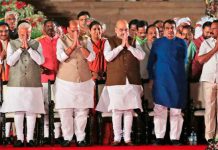Lok Sabha Passes Aadhaar Bill 2016
- Union Finance Minister Arun Jaitley introduced the Aadhaar (Targeted Delivery of Financial and Other Subsidies, Benefits and Services) Bill, 2016 in the Lok Sabha.
- The Bill provides statutory backing to Aadhaar, the unique identity number through which the government plans to target delivery of subsidy benefits and services.
- The expenditure for the nationwide Aadhaar exercise is incurred from the Consolidated Fund of India.
- The Bill provides for the establishing of the Unified Identification Authority of India (UIDAI) and the establishment, operation and maintenance of the Central Identity Data Repository.
- The Authority shall ensure the security, confidentiality and protection of identity information and authentication records of individuals in its possession or control, including the information stored in the repository, according to the Bill. These include biometric information collected, created and stored in electronic form.
- The government expects to address, through the proposed legislation, concerns that have been raised on the mandatory use of Aadhaar in government schemes.
- The Supreme Court has restricted the use of the Aadhaar number until a Constitution Bench delivers its verdict on a number of cases concerning privacy and other issues.
- Under the provisions of the Bill, the Aadhaar number cannot confer right of or proof of citizenship of domicile.
- An estimated expenditure of Rs. 13,663.22 crore has been approved for implementing the Aadhaar scheme up to the financial year 2016-17.
- Jaitley introduced the measure as a money Bill, which can only be introduced in the Lok Sabha and to which the Rajya Sabha — where the NDA government does not enjoy a majority — cannot make amendments.
- The Upper House can only make recommendations to money Bills and must return such legislation to the Lok Sabha within 14 days from the date of their receipt, thus ensuring a time-bound process.
Main Provisions of the Bill:
The Aadhaar (Targeted Delivery of Financial and Other Subsidies, Benefits and Services) Bill 2016 intends to provide for targeted delivery of subsidies and services to individuals residing in India by assigning them unique identity numbers, called Aadhaar numbers.
Eligibility:
Every resident shall be entitled to obtain an Aadhaar number. A resident is a person who has resided in India for 182 days, in the one year preceding the date of application for enrolment for Aadhaar.
Information to be submitted:
To obtain an Aadhaar number, an individual has to submit his, (i) biometric (photograph, finger print, iris scan) and (ii) demographic (name, date of birth, address) information. The Unique Identification Authority (UID) may specify other biometric and demographic information to be collected by regulations.
Enrolment:
At the time of enrolment, the individual will be informed of, (i) the manner in which the information will be used, (ii) the nature of recipients with whom the information will be shared, and (iii) the right to access this information. After verification of information provided by a person, an Aadhaar number will be issued to him.
Use of Aadhaar number:
To verify the identity of a person receiving a subsidy or a service, the government may require them to have an Aadhaar number. If a person does not have an Aadhaar number, government will require them to apply for it, and in the meanwhile, provide an alternative means of identification. Any public or private entity can accept the Aadhaar number as a proof of identity of the Aadhaar number holder, for any purpose. Aadhaar number cannot be a proof of citizenship or domicile.
Unified Identification Authority of India:
The Bill provides for the establishing of the Unified Identification Authority of India (UIDAI) and the establishment, operation and maintenance of the Central Identity Data Repository.
Functions and composition of authority:
The key functions of the UID authority include,
(i) specifying demographic and biometric information to be collected during enrolment,
(ii) assigning Aadhaar numbers to individuals,
(iii) authenticating Aadhaar numbers, and
(iv) specifying the usage of Aadhaar numbers for delivery of subsidies and services.
The UID authority will consist of a chairperson, two part-time members and a chief executive officer. The chairperson and members are required to have experience of at least ten years in matters such as technology, governance, etc.
Authentication: The UID authority will authenticate the Aadhar number of an individual, if an entity makes such a request. A requesting entity (an agency or person that wants to authenticate information of a person) has to obtain the consent of an individual before collecting his information. The agency can use the disclosed information only for purposes for which the individual has given consent.
Response to authentication query: The UID authority shall respond to an authentication query with a positive, negative or other appropriate response. However, it is not permitted to share an individual’s finger print, iris scan and other biological attributes.
Authentication record maintained by UID authority: The UID authority shall record the entity requesting verification of a person’s identity, the time of request and the response received by the entity. The purpose for which an individual’s identity needs to be verified will not be maintained.
Protection of information: Biometric information such as an individual’s finger print, iris scan and other biological attributes (specified by regulations) will be used only for Aadhaar enrolment and authentication, and for no other purpose. Such information will not be shared with anyone, nor will it be displayed publicly, except for purposes specified by regulations.
Cases when information may be revealed: In two cases, information may be revealed:
1. In the interest of national security, a Joint Secretary in the central government may issue a direction for revealing, (i) Aadhaar number, (ii) biometric information (iris scan, finger print and other biological attributes specified by regulations), (iii) demographic information, and (iv) photograph. Such a decision will be reviewed by an Oversight Committee(comprising Cabinet Secretary, Secretaries of Legal Affairs and Electronics and Information Technology) and will be valid for six months.
2. On the order of a court, (i) an individual’s Aadhaar number, (ii) photograph, and (iii) demographic information, may be revealed.
Offences and penalties: A person may be punished with imprisonment upto three years and minimum fine of Rs 10 lakh for unauthorised access to the centralized data-base, including revealing any information stored in it. If a requesting entity and an enrolling agency fail to comply with rules, they shall be punished with imprisonment upto one year or a fine upto Rs 10,000 or Rs one lakh (in case of a company), or with both.
Cognizance of offence: No court shall take cognizance of any offence except on a complaint made by the UID authority or a person authorised by it.
Controversy on this Bill:
- Since its introduction as a money bill in the Lok Sabha, the Aadhaar (Targeted delivery of Financial and other subsidies, benefits and services) Bill, 2016 has been embroiled in controversy.
- The Lok Sabha rejected the five recommendations of the Rajya Sabha and adopted the bill and only presidential assent was required for it become to become valid law.
- However, former Union Minister Jairam Ramesh filed a writ petition contesting the decision to treat the Aadhaar Bill as a money bill. The petition is due to be heard before the Supreme Court , and should the court decide to entertain the petition, it could have far-reaching implications for the Aadhaar project and the manner in which money bills are passed by the Parliament.
- PDT Achary, former secretary general of the Lok Sabha, has expressed concern about the use of Money Bills as a means to circumvent the Rajya Sabha.
- The petition by Jairam Ramesh would hinge largely on the powers of the judiciary to question the decision of the Speaker of the Lok Sabha. Article 110 (3) is very clear in pronouncing the authority of the Speaker as final and binding.
- Additionally, Article 122 prohibits the courts from questioning the validity of any proceedings in Parliament on the ground of any alleged irregularity of procedure.
- The powers of privilege that Parliamentarians enjoy are integral to the principle of separation of powers. However, the courts may be able to make a fine distinction between inquiring into procedural irregularity which is prohibited by the Constitution; and questioning an incorrect application of substantive principles.























